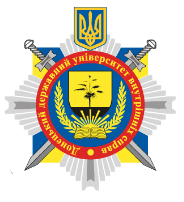КРИМІНАЛЬНЕ ПРОВАДЖЕННЯ: ПРОБЛЕМНІ ПИТАННЯ ПОНЯТІЙНО- КАТЕГОРІЙНОГО АПАРАТУ
DOI:
https://doi.org/10.32366/2709-9261-2021-1-1-36-42Ключові слова:
кримінальне провадження; поняття; категорії; кримінальне правопорушення; кримінальний проступок; злочин; досудове розслідування.Анотація
Аналізуються зміни в понятійно-категорійному апараті наук кримінально-правового блоку у зв’язку з оновленням кримінального й кримінального процесуального законодавства України. Відзначається, що нормативне введення в обіг нових категорій без належного теоретичного обґрунтування породжує низку суперечностей під час вирішення багатьох завдань кримінального провадження. Констатується необхідність узгодження понять і категорій галузевих і прикладних наук кримінально-правового блоку, що є запорукою прийняття правильних процесуальних і тактичних рішень під час кримінального провадження. Формулюється висновок, що понятійно- категорійний апарат набуває ознак системності й несуперечливості тільки тоді, коли процес формування понять і категорій послідовно проходить усі етапи – від теоретичних гіпотез (пропозицій) до їхньої практичної апробації та легалізації.
Посилання
Філософський енциклопедичний словник. Київ: Абрис, 2002. 742 с.
Панов М. Проблеми формування понятійного апарату юридичної науки: методологічні аспекти. Вісник Академії правових наук України. 2003. № 2–3 (33–34). С. 54–67.
Панов М. Понятійний апарат кримінального права та його науково-практичне значення. Право України. 2018. № 4. С. 205–222.
Панов М. І. Про співвідношення і взаємозв’язок понятійних апаратів наук кримінального блоку. Проблеми законності. 2019. Вип. 146. С. 158–170.
Про внесення змін до деяких законодавчих актів України щодо спрощення досудового розслідування окремих категорій кримінальних правопорушень : Закон України № 2617-VIII від
11.2018. URL: https://zakon.rada.gov.ua/laws/show/2617-19 (дата звернення: 05.01.2021).
Лобойко Л. М. Реформування кримінально-процесуального законодавства в Україні (2006–2011 роки). Частина 1. Загальні положення і досудове провадження : монографія. Київ: Істина, 2012. 288 с.
Зеленецький В. С. Дослідче провадження про вчинений злочин : наук.-практ. посіб. Х.: Право, 2009. 128 с.
Зеленецкий В. С., Лобойко Л. Н. Доследственный уголовный процесс : монография. Донецк: ООО «Схід. видав. дім», 2012. 397 с.
Филин Д. В. Начало досудебного производства в уголовном процессе Украины. URL: https://www.iuaj.net/node/1462 (дата звернення: 05.01.2021).
Удалова Л. Д. Проблемні питання початку досудового розслідування. Юридичний часопис Національної академії внутрішніх справ. 2016. № 1 (11). С. 228–237.





